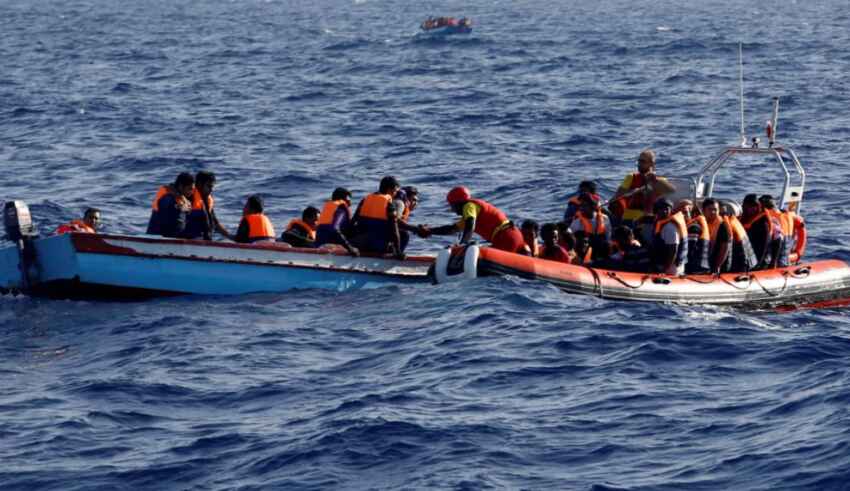
The election of Ms. Meloni as prime minister and the establishment of the far-right government in Italy, in connection with the harsh policy demonstrated by the Greek government in the Aegean, brings immigration for good back to the issues that will concern the EU in the coming months. The ongoing instability in Africa (mainly in the Sahel zone) and the Middle East, in conjunction with the hope for a better future, leads everyday hundreds of people to risk their lives crossing the Mediterranean to reach Europe. A Europe that, however, refuses to accept them, finding itself several times (through its member states) even committing violations of international law and human rights.
In Greece, since the conservative Nea Dimokratia party came to power in 2019, the country’s migration policy has become more repulsive. The government from day one, announced that Greece will effectively protect its borders and will not allow the entry of irregular immigrants into its territory and territorial waters. Along with the contribution of Frontex, the Greek Coast Guard expanded its patrols in order to prevent irregular entries. The Minister of Migration, Mr. Mitarakis in one of his interviews stated that Greece is protecting the “borders of Europe”. However, the reality was different, as an investigation carried out by 5 European media (Lighthouse Reports, Der Spiegel, SRF Rundschau, Republik and Le Monde) highlighted the implementation of push backs by the Greek coast guard with the contribution of Frontex. In fact, an OLAF report states that Frontex was turning a blind eye to Greek human rights violations at sea. These revelations led to the resignation of Fabrice Leggeri (head of Frontex) and to LIBE’s Committee request to the Commission to take measures to ensure that Greece respects International Law.
The practice of push backs, however, had another consequence. It created a new route towards Europe, the one between Turkey and Italy which completely bypasses Greece. The route proves to be particularly dangerous and deadly for the people who attempt to follow it. In the last few weeks alone, 2 shipwrecks have been recorded in Greece, with the dead reaching 21 so far. Similar shipwrecks had also occurred in October, in which minors were also among the victims. The situation may worsen if asylum-seekers are left adrift at sea.
In the other “entry country” of the EU, the new government presented its positions on migration from the outset. Ms. Meloni in her first speech as prime minister pledged to stop the arrival of migrants from Africa. This policy has already started to be implemented with the ban on docking of a ship in a Sicilian port. The Ocean Viking was forced to head to France for docking, with the move fuelling ongoing tension between Paris and Rome.
At the same time, at two ships, the Humanity 1 and the Geo Barents, which managed to dock at the Italian port, it became known that only those deemed by the Italian government to be in need of protection will be allowed to disembark. The new Minister of the Interior, Matteo Piadetto, a member of Matteo Salvini’s party that had closed the ports in the past, referring to the incident described the asylum seekers remaining on the ships as “residual cargo”, or men who do not need to be rescued. The choice of the Italian government to prohibit the disembarkation of hundreds of people is a direct violation of international law and European values. Since the Italian authorities allowed the ships to dock, they had no right to discriminate against the rescued.
The EU should not overlook such decisions that put people’s lives in danger. States have assumed the obligation to protect human rights at sea under the international law of the sea and human rights law; an obligation which in the past has been side-lined. Beyond the moral duty we owe to show towards human life, especially that of a minor, the Law of the Sea Convention imposes on States the duties to protect life at sea (Articles 94 and 98).
Violations of international law by member states must be taken seriously by the EU. Furthermore, it is time for the EU to decide which direction it wants to go. Are states on the external border of the EU to become watchdogs, are human rights only for those living in the EU or are we able to act as a Union on the matter? It is no longer possible for Europe to bury its head like an ostrich when it comes to the lives and rights of asylum seekers. Migration is not a crisis, it is not a problem to be solved in order to stop. On the contrary, it is another human phenomenon and should be treated as such. As long as Europe washes its hands, people’s rights and lives will continue to be lost in the Mare Nostrum.
By The European Institute for International Law and International Relations.















